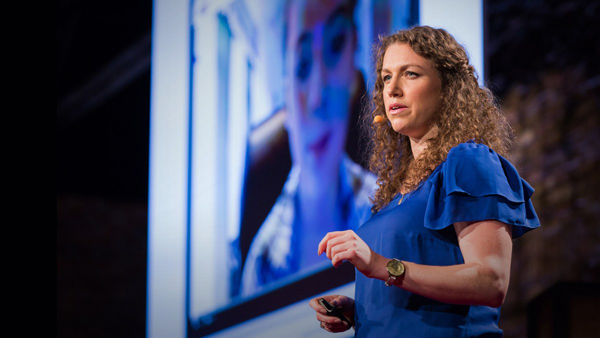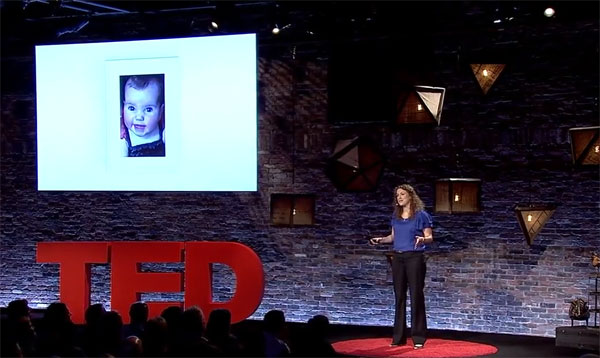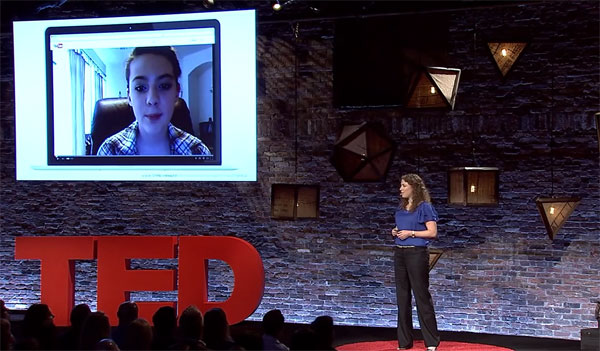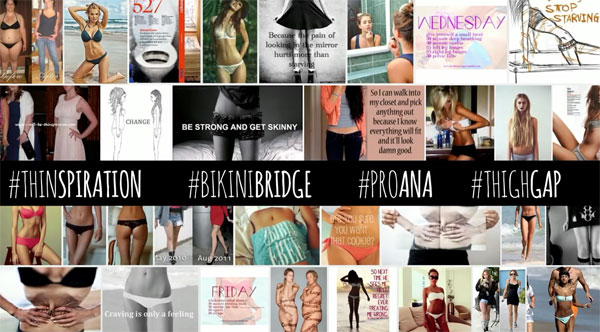Học tiếng Anh với TED: Tại sao suy nghĩ bạn xấu xí lại không tốt cho bạn?
Học tiếng Anh với TED: Tại sao suy nghĩ bạn xấu xí lại không tốt cho bạn?
Trong bài viết này, mời các bạn cùng học tiếng Anh với TED qua một chủ đề cực kỳ thú vị: "Tại sao suy nghĩ bạn xấu xí lại không tốt cho bạn?' qua bài phát biểu của Meaghan Ramsey đến từ dự án Dove Self-Esteem. Sau đây mời các bạn cùng lắng nghe và theo dõi Transcript và Bản dịch dưới đây để học tiếng Anh hiệu quả hơn cùng VnDoc nhé!
Street Food Around The World: Hanoi (Vietsub)
Luyện kỹ năng nghe Tiếng Anh: Nick Vujicic Vượt lên nghịch cảnh
Học tiếng Anh qua video: Những bài học vô giá của huyền thoại tỷ phú Jack Ma

Khoảng 10,000 người/tháng tìm trên Google cụm từ: "Có phải tôi xấu xí không?", Meaghan Ramsey đến từ dự án Dove Self-Esteem có cảm giác rằng nhiều người trong số họ là các cô gái trẻ. Trong bài nói mở ra phần thảo luận sâu sắc, bà dẫn dắt chúng ta đi qua những ảnh hưởng đầy bất ngờ mà sự thiếu tự tin về vóc dáng và hình ảnh đem lại - từ việc nhận điểm thấp ở trường, đến tỉ lệ sử dụng ma túy và chất có cồn cao. Sau đó, bà chia sẻ những mấu chốt để phá vỡ hiện trạng này.
Dưới đây là video "Tại sao suy nghĩ bạn xấu xí lại không tốt cho bạn?" của Meaghan Ramsey:
Dưới đây là transcript và subtitle của bài phát biểu 'Tại sao suy nghĩ bạn xấu xí lại không tốt cho bạn?' của Meaghan Ramsey, mời các bạn theo dõi để học tiếng Anh hiệu quả hơn nhé!
TRANSCRIPT:
00:11
This is my niece, Stella. She's just turned one and started to walk. And she's walking in that really cool way that one-year-olds do, a kind of teetering, my-body's-moving- too-fast-for-my-legs kind of way. It is absolutely gorgeous. And one of her favorite things to do at the moment is to stare at herself in the mirror. She absolutely loves her reflection. She giggles and squeals, and gives herself these big, wet kisses. It is beautiful. Apparently, all of her friends do this and my mom tells me that I used to do this, and it got me thinking: When did I stop doing this? When is it suddenly not okay to love the way that we look? Because apparently we don't.

01:02
Ten thousand people every month google, "Am I ugly?" This is Faye. Faye is 13 and she lives in Denver. And like any teenager, she just wants to be liked and to fit in. It's Sunday night. She's getting ready for the week ahead at school. And she's slightly dreading it, and she's a bit confused because despite her mom telling her all the time that she's beautiful, every day at school, someone tells her that she's ugly. Because of the difference between what her mom tells her and what her friends at school, or her peers at school are telling her, she doesn't know who to believe. So, she takes a video of herself. She posts it to YouTube and she asks people to please leave a comment: "Am I pretty or am I ugly?" Well, so far, Faye has received over 13,000 comments. Some of them are so nasty, they don't bear thinking about. This is an average, healthy-looking teenage girl receiving this feedback at one of the most emotionally vulnerable times in her life. Thousands of people are posting videos like this, mostly teenage girls, reaching out in this way. But what's leading them to do this?

02:19
Well, today's teenagers are rarely alone. They're under pressure to be online and available at all times, talking, messaging, liking, commenting, sharing, posting — it never ends. Never before have we been so connected, so continuously, so instantaneously, so young. And as one mom told me, it's like there's a party in their bedroom every night. There's simply no privacy. And the social pressures that go along with that are relentless. This always-on environment is training our kids to value themselves based on the number of likes they get and the types of comments that they receive. There's no separation between online and offline life. What's real or what isn't is really hard to tell the difference between. And it's also really hard to tell the difference between what's authentic and what's digitally manipulated. What's a highlight in someone's life versus what's normal in the context of everyday.
03:26
And where are they looking to for inspiration? Well, you can see the kinds of images that are covering the newsfeeds of girls today. Size zero models still dominate our catwalks. Airbrushing is now routine. And trends like #thinspiration, #thighgap, #bikinibridge and #proana. For those who don't know, #proana means pro-anorexia. These trends are teamed with the stereotyping and flagrant objectification of women in today's popular culture. It is not hard to see what girls are benchmarking themselves against. But boys are not immune to this either. Aspiring to the chiseled jaw lines and ripped six packs of superhero-like sports stars and playboy music artists.

04:12
But, what's the problem with all of this? Well, surely we want our kids to grow up as healthy, well balanced individuals. But in an image-obsessed culture, we are training our kids to spend more time and mental effort on their appearance at the expense of all of the other aspects of their identities. So, things like their relationships, the development of their physical abilities, and their studies and so on begin to suffer. Six out of 10 girls are now choosing not to do something because they don't think they look good enough. These are not trivial activities. These are fundamental activities to their development as humans and as contributors to society and to the workforce. Thirty-one percent, nearly one in three teenagers, are withdrawing from classroom debate. They're failing to engage in classroom debate because they don't want to draw attention to the way that they look. One in five are not showing up to class at all on days when they don't feel good about it. And when it comes to exams, if you don't think you look good enough, specifically if you don't think you are thin enough, you will score a lower grade point average than your peers who are not concerned with this. And this is consistent across Finland, the U.S. and China, and is true regardless of how much you actually weigh. So to be super clear, we're talking about the way you think you look, not how you actually look. Low body confidence is undermining academic achievement.
05:55
But it's also damaging health. Teenagers with low body confidence do less physical activity, eat less fruits and vegetables, partake in more unhealthy weight control practices that can lead to eating disorders. They have lower self-esteem. They're more easily influenced by people around them and they're at greater risk of depression. And we think it's for all of these reasons that they take more risks with things like alcohol and drug use; crash dieting; cosmetic surgery; unprotected, earlier sex; and self-harm. The pursuit of the perfect body is putting pressure on our healthcare systems and costing our governments billions of dollars every year.
06:40
And we don't grow out of it. Women who think they're overweight — again, regardless of whether they are or are not — have higher rates of absenteeism. Seventeen percent of women would not show up to a job interview on a day when they weren't feeling confident about the way that they look.
07:01
Have a think about what this is doing to our economy. If we could overcome this, what that opportunity looks like. Unlocking this potential is in the interest of every single one of us.
07:15
But how do we do that? Well, talking, on its own, only gets you so far. It's not enough by itself. If you actually want to make a difference, you have to do something. And we've learned there are three key ways: The first is we have to educate for body confidence. We have to help our teenagers develop strategies to overcome image-related pressures and build their self-esteem. Now, the good news is that there are many programs out there available to do this. The bad news is that most of them don't work. I was shocked to learn that many well-meaning programs are inadvertently actually making the situation worse. So we need to make damn sure that the programs that our kids are receiving are not only having a positive impact, but having a lasting impact as well.
08:09
And the research shows that the best programs address six key areas: The first is the influence of family, friends and relationships. The second is media and celebrity culture, then how to handle teasing and bullying, the way we compete and compare with one another based on looks, talking about appearance — some people call this "body talk" or "fat talk" — and finally, the foundations of respecting and looking after yourself. These six things are crucial starting points for anyone serious about delivering body-confidence education that works. An education is critical, but tackling this problem is going to require each and everyone of us to step up and be better role models for the women and girls in our own lives. Challenging the status quo of how women are seen and talked about in our own circles.
09:02
It is not okay that we judge the contribution of our politicians by their haircuts or the size of their breasts, or to infer that the determination or the success of an Olympian is down to her not being a looker. We need to start judging people by what they do, not what they look like.
09:23
We can all start by taking responsibility for the types of pictures and comments that we post on our own social networks. We can compliment people based on their effort and their actions and not on their appearance.
09:39
And let me ask you, when was the last time that you kissed a mirror? Ultimately, we need to work together as communities, as governments and as businesses to really change this culture of ours so that our kids grow up valuing their whole selves, valuing individuality, diversity, inclusion. We need to put the people that are making a real difference on our pedestals, making a difference in the real world. Giving them the airtime, because only then will we create a different world. A world where our kids are free to become the best versions of themselves, where the way they think they look never holds them back from being who they are or achieving what they want in life.
10:29
Think about what this might mean for someone in your life. Who have you got in mind? Is it your wife? Your sister? Your daughter? Your niece? Your friend? It could just be the woman a couple of seats away from you today. What would it mean for her if she were freed from that voice of her inner critic, nagging her to have longer legs, thinner thighs, smaller stomach, shorter feet? What could it mean for her if we overcame this and unlocked her potential in that way?
11:07
Right now, our culture's obsession with image is holding us all back. But let's show our kids the truth. Let's show them that the way you look is just one part of your identity and that the truth is we love them for who they are and what they do and how they make us feel. Let's build self-esteem into our school curriculums. Let's each and every one of us change the way we talk and compare ourselves to other people. And let's work together as communities, from grassroots to governments, so that the happy little one-year-olds of today become the confident changemakers of tomorrow. Let's do this. (Applause)


